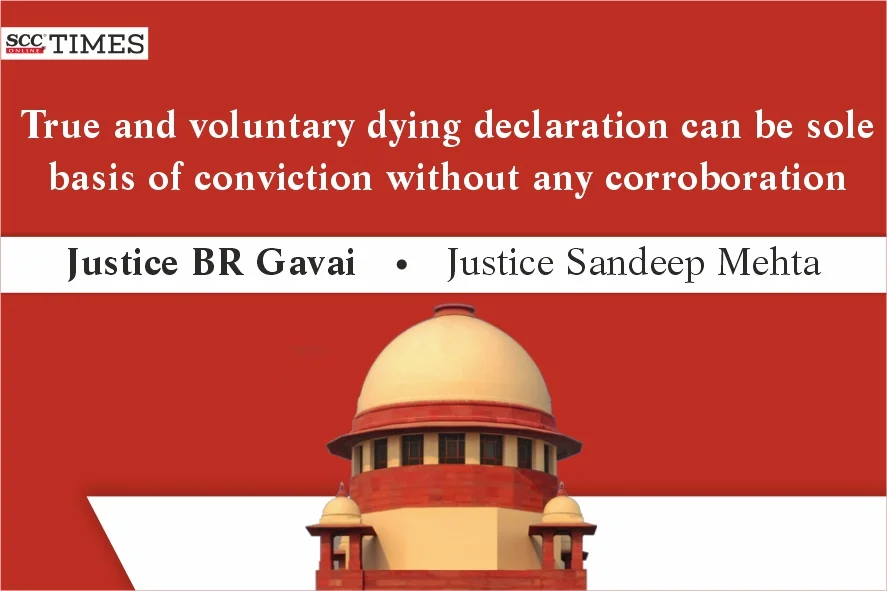Supreme Court: In a set of two criminal appeals against Allahabad High Court’s decisions, whereby the convicts’ criminal appeals were dismissed and the conviction by the Trial Court was upheld, the Division Bench of BR Gavai* and Sandeep Mehta, JJ. allowed one appeal and dismissed another. The Court held that the dying declaration of the deceased was cogent, trustworthy and reliable and hence, could form the sole basis for the conviction of one of the convicts.
Background
On 01-12-2016, a written report was received by the police station at 08:15 pm which was a transcription of the complaint made by the deceased, admitted in the District Hospital, Moradabad on 1-12-2016, at 02:20 pm with 80 per cent deep thermal and facial burns. It was alleged that she was set ablaze by the convicts (her brother-in-law, sister-in-law and sister-in-law’s brother) who had been pressuring her into entering the profession of immoral trafficking and prostitution. On the basis of the written report a First Information Report (‘FIR’) was registered at Police Station Katghar, for the offence punishable under Section 307 of the Penal Code, 1860 (‘IPC’). Between 08:48 pm and 09:15 pm dying declaration of the deceased was recorded. On 2-12-2016, the deceased eventually succumbed to her injuries at 07:55 pm. Consequently, the FIR was altered to the offence punishable under Section 302 of the IPC. According to the Post-Mortem Report, the cause of death was shock as a result of ante-mortem burn injuries.
The Trial Court convicted the present convicts for offences punishable under Sections 302 and 34 of the IPC and sentenced them to undergo imprisonment for life along with fine. The High Court dismissed the appeals and affirmed the order of conviction and sentence by the Trial Court. Hence, the present appeals.
Analysis and Decision
The Court noted that in the present case, the conviction was based solely on the dying declaration. The Court relied on Atbir v. Govt. (NCT of Delhi), (2010) 9 SCC 1 wherein certain factors to be taken into consideration while resting the conviction on the basis of dying declaration have been laid down. The Court reiterated that dying declaration can be the sole basis of the conviction if it inspires the full confidence of the Court and the Court is required to satisfy itself that the deceased was in a fit state of mind at the time of making the statement and that it was not the result of tutoring, prompting or imagination. When the Court is satisfied about the dying declaration being true and voluntary, it can base its conviction without any further corroboration. Further, the Court reiterated that there cannot be an absolute rule of law that the dying declaration cannot form the sole basis of conviction unless it is corroborated.
The Court noted that the Chief Medical Officer had informed the Naib Tehsildar about the sound condition of the deceased to give her statement and that she was in a fit state of mind at the time of making the statement and that it was not the result of tutoring, prompting or imagination. The Court, on perusal of Tehsildar’s statement, noted that the deceased put her thumb impression on her statement and that the deceased answered in her full senses and she was understanding the questions. The Court also noted from the Naib Tehsildar’s deposition that he had taken care to ensure that none of the relatives of the deceased were present when the dying declaration was being recorded. The Court said that the dying declaration was coherent and consistent and as such, there was no legal impediment to make it the basis of conviction without there being any independent corroboration. The Court held that the dying declaration was cogent, trustworthy and reliable to base the conviction on the same.
On perusal of the dying declaration, the Court noted that the deceased had a dispute over partition of property with her brother-in-law (convict) who had the motive and poured kerosene on the deceased and set her ablaze. The Court said that insofar as the other two convicts i.e., the sister-in-law and her brother were concerned, it was stated in the dying declaration that they aided the deceased’s brother-in-law, however, no specific role of how they assisted him could be found in the dying declaration. Therefore, the Court said that the said dying declaration can be the sole basis of maintaining the conviction of the deceased’s brother-in-law and in the absence of any specific role attributed to sister-in-law and her brother, they were entitled to the benefit of doubt.
Thus, the Court allowed the sister-in-law’s and her brother’s appeal and set aside the impugned Judgment in respect of both the convicts. However, the Court dismissed the brother-in-law’s/ convict’s appeal.
[Naeem v. State of U.P., 2024 SCC OnLine SC 237, Decided on: 05-03-2024]
Judgment Authored by: Justice BR Gavai







